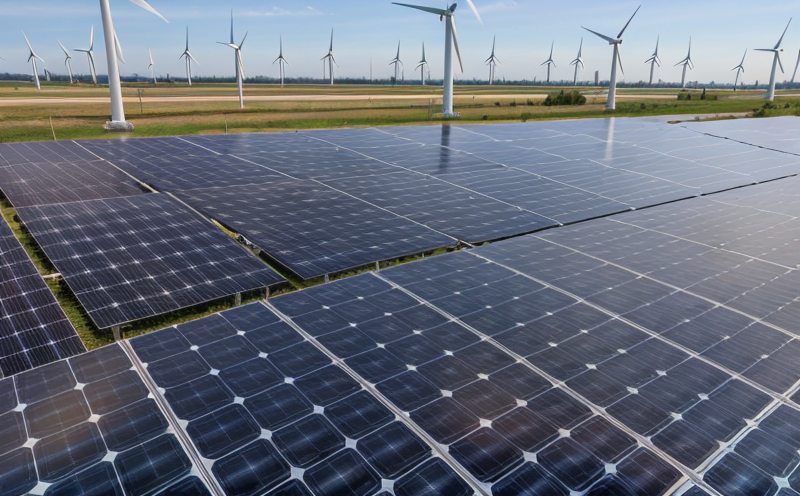IEEE 2800 Interconnection Testing for Large-Scale Renewables
The IEEE Std. 2800-2017 standard provides a framework for the interconnection of large-scale renewable energy resources into the electrical grid. This service focuses on testing and validating compliance with this standard to ensure safe, reliable, and efficient integration of renewable energy sources into existing power systems.
As the world transitions towards greater reliance on renewable energy, ensuring that these resources can seamlessly integrate into the grid is crucial for maintaining stability and reliability. The IEEE 2800 interconnection testing service involves a comprehensive suite of tests designed to evaluate the performance characteristics of large-scale renewable energy projects against industry best practices.
Our laboratory adheres strictly to the requirements outlined in IEEE Std. 2800-2017, which includes both technical and operational aspects. The primary goal is to verify that interconnecting devices meet the necessary criteria for safe operation within the grid environment. This involves rigorous testing of key performance indicators such as short-circuit current, fault ride-through capability, reactive power contribution, harmonic distortion levels, voltage regulation, and more.
For quality managers and compliance officers, this service ensures adherence to regulatory standards and facilitates smoother interactions with utility providers. R&D engineers benefit from detailed insights into the behavior of new technologies under real-world conditions. Meanwhile, procurement professionals gain confidence knowing that suppliers meet stringent technical requirements before deployment.
- Short-Circuit Current Limits
- Fault Ride-Through Capability
- Reactive Power Contribution
- Voltage Regulation
- HVDC (High Voltage Direct Current) Interface Compliance
- Harmonic Distortion Levels
- Active and Reactive Power Control Performance
- Communication Protocols Compliance
The testing process begins with thorough documentation of the renewable energy system’s design and specifications. From there, our experts conduct a series of laboratory tests using state-of-the-art equipment calibrated to international standards like IEEE Std. 2800-2017.
Once completed, we provide detailed reports summarizing all findings alongside recommendations for any necessary adjustments or enhancements. These documents serve as valuable resources not only during interconnection negotiations but also throughout the operational lifecycle of the project.
By partnering with us, you gain access to cutting-edge facilities and experienced personnel dedicated to helping your organization navigate complex regulatory landscapes successfully. Our commitment lies in delivering accurate, reliable results that meet or exceed expectations set forth by relevant authorities.
Why It Matters
The integration of large-scale renewable energy resources into the grid is critical for achieving sustainable development goals while enhancing resilience against climate change impacts. However, integrating such systems without proper planning can lead to issues like overvoltage, underfrequency conditions, or instability in supply.
Compliance with IEEE 2800 ensures that these risks are minimized by providing clear guidelines on how to design and operate renewable energy facilities safely within the grid framework. By adhering to this standard during installation phases, operators can avoid costly disruptions later down the line due to non-compliant equipment or improper configurations.
Moreover, compliance enhances trust between stakeholders involved in the project lifecycle—from developers seeking permits through utilities responsible for managing the overall network. It fosters a collaborative environment where all parties understand each other’s roles and responsibilities towards successful implementation.
In summary, IEEE 2800 interconnection testing is essential for ensuring safe, efficient, and reliable integration of large-scale renewable energy resources into existing power systems. This service plays an integral role in supporting the global shift toward cleaner and more sustainable forms of electricity generation.
Scope and Methodology
The scope of our IEEE 2800 interconnection testing service encompasses a wide range of activities aimed at verifying compliance with all relevant provisions specified within this standard. Our methodology follows stringent protocols designed to ensure accuracy, consistency, and reproducibility across multiple test scenarios.
Key components include:
- Documentation Review: Initial assessment of technical documentation provided by clients regarding their renewable energy systems.
- Laboratory Testing: Utilization of advanced instrumentation calibrated according to internationally recognized standards such as IEEE Std. 2800-2017 for evaluating various performance parameters.
- Data Analysis & Reporting: Comprehensive evaluation and presentation of test results along with actionable recommendations based on identified gaps or deviations from prescribed limits.
Throughout the entire process, our team maintains close communication with clients to ensure that all concerns are addressed promptly. This collaborative approach helps build trust while ensuring accurate interpretations of test outcomes.
Industry Applications
The IEEE 2800 interconnection testing service finds application across various sectors including:
- Utility Companies: Ensures seamless integration of large-scale renewable energy projects into utility grids, enhancing reliability and efficiency.
- Renewable Energy Developers: Provides assurance that their facilities meet all necessary regulatory requirements before going live, reducing potential delays or rejections.
- Regulatory Bodies: Supports enforcement efforts aimed at maintaining high standards for interconnecting devices within the grid ecosystem.
- EPC Contractors & Engineers: Offers valuable data points during design and construction phases to optimize performance while minimizing risks associated with non-compliance.
In each case, compliance with IEEE 2800 not only facilitates regulatory approval but also contributes significantly toward building a robust, resilient grid capable of supporting growing demands for clean energy.





